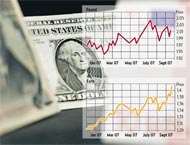EU finance ministers debate post-recession exit strategies
 Gothenburg, Sweden - European Union finance ministers began debating Thursday how to deflate their ballooning budget deficits, as the continent's economy showed signs of a "tentative recovery."
Gothenburg, Sweden - European Union finance ministers began debating Thursday how to deflate their ballooning budget deficits, as the continent's economy showed signs of a "tentative recovery."
EU governments have pumped hundreds of millions of euros into their economies to mitigate the impact of a devastating recession - the worst in decades.
But such extra discretionary spending has caused a surge in their budget deficits and public debt levels.
"The economy is clearly moving towards a tentative recovery, obviously based on the very, very strong fertilizers that we are getting from economic policy," said Swedish Finance Minister Anders Borg, the host of an informal meeting in Gothenburg, Sweden.
"At the same time, we have to start designing and communicating exit strategies" since "fiscal policy in Europe is not on a sustainable course," Borg said.
Around 20 out of 27 member states face infringement procedures from the European Commission for exceeding the bloc's budget deficit threshold, set at 3 per cent of gross domestic product.
Public debt levels, meanwhile, could reach 100 per cent of GDP by 2015 unless action is taken, Borg said ahead of Thursday's meeting.
Ministers are increasingly concerned that high debt levels could undermine their credibility and jeopardize future spending plans.
Joaquin Almunia, the EU's economic and monetary affairs commissioner, has said he wants EU countries to cut discretionary spending in 2011.
Borg and Jean-Claude Juncker, the influential chairman of the eurogroup, both agree that coordinated "exit strategies" should be implemented as soon as the recession is over.
But not all are convinced.
"Every country will have to define its own exit strategy in due time. I don't think that we can have a precise schedule or a common schedule," said Portuguese Finance Minister Fernando Teixeira dos Santos.
The fact that not all EU countries will get out of the current crisis at the same time means that a "flexible approach" is needed, dos Santos said.
The meeting was taking place on the back of a new report from the International Monetary Fund (IMF) suggesting that the world economy was finally pulling out of its worst recession since World War II.
According to the IMF's improved forecasts, the world economy is set to shrink by 1.1 per cent this year before growing at 3.1 per cent in 2010.
The speed of recovery within the EU, however, is expected to vary.
While France and Germany both posted positive growth rates in the second quarter of this year, the economies of Italy, Britain and Spain remained in negative territory.
And of the EU's seven major economies, only Poland is expected to post positive yearly growth rates for 2009, according to the commission's latest forecasts.
According to Spanish Finance Minister Elena Salgado, "2011 may be the appropriate year" for a common exit strategy. "But we will have to wait because we are not there yet," she added.
During their two-day talks in Gothenburg, EU finance ministers are also expected to discuss plans for joint supervision of their financial markets. Sweden wants a deal to be reached during its EU presidency, which ends at the end of the year.
"It is important that bankers and the financial markets don't underestimate the political commitment to a new era of fiscal responsibility," said Borg.
And while differences remain, notably between Britain and the rest of the EU, our views are "converging", dos Santos said.
Ministers were also expected to be presented with the results of a so-called "stress test" on 22 large European banks.
The exercise, carried out by the Committee of European Banking Supervisors, sought to test the solidity of European banks in the wake of the global credit crunch. (dpa)